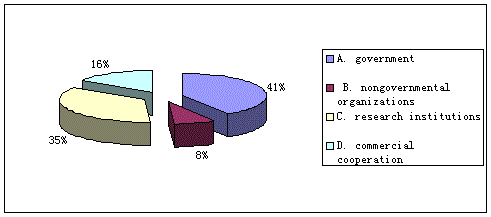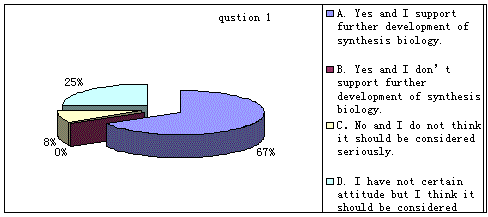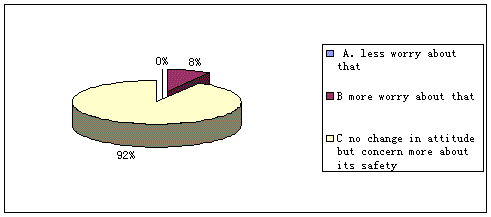Team:USTC/Project/survey
From 2010.igem.org
Knightmare (Talk | contribs) |
(→SURVEY OVERVIEW) |
||
| (26 intermediate revisions not shown) | |||
| Line 1: | Line 1: | ||
__NOTOC__ | __NOTOC__ | ||
{{Template:USTCiGEM2010_header}} | {{Template:USTCiGEM2010_header}} | ||
| - | |||
| - | <html>< | + | <html> |
| + | <style> | ||
| + | #transparent{ | ||
| + | position:relative; | ||
| + | left:255px; | ||
| + | width:675px; | ||
| + | height:5500px; | ||
| + | padding:10px; | ||
| + | background-image:url(https://static.igem.org/mediawiki/2010/a/a0/Transppa.png); | ||
| + | background-repeat:repeat; | ||
| + | filter:alpha(opacity=90); | ||
| + | opacity:0.90; | ||
| + | border-bottom-right-radius:20px; | ||
| + | border-bottom-left-radius:20px; | ||
| + | border-top-left-radius:20px; | ||
| + | border-top-right-radius:20px; | ||
| + | } | ||
| + | </style> | ||
| + | <div id="transparent"> | ||
| + | </html> | ||
| + | ---- | ||
| + | |||
| + | |||
<p style="text-align:left"> | <p style="text-align:left"> | ||
Below are the results of the questionnaire answered by people before the talk. </p> | Below are the results of the questionnaire answered by people before the talk. </p> | ||
| + | |||
| + | |||
| + | == SURVEY OVERVIEW == | ||
| + | <html> | ||
| + | <style> | ||
| + | .firstletter{ | ||
| + | font-size:3em; | ||
| + | line-height:0.95; | ||
| + | float:left; | ||
| + | </style> | ||
| + | </html> | ||
| + | <p ><span class="firstletter">O</span> | ||
| + | ur survey includes two parts, one conducted before our campus talk and the other after that. 106 students took part in the former part and 12 students took part in the second . We adjust our campus talk according to the information we collected in part one and collected information to see the influence our campus talk and open day to the audience in part two. The result is reported as following.</P> | ||
| + | |||
| + | == SURVEY BEFORE CAMPUS TALK(SECTION ONE) == | ||
| + | |||
<p>The first two questions are about people’s attitude towards genetic manipulation. The results somewhat worry us. As they show, more than a half of the students resist genetically modified food and are terrified when hearing that something is genetically modified. Probably, they will show similar concern towards what we are doing in the area of synthetic biology. On the other hand, as the third question shows, students show much enthusiasm for gene manipulation. So there is a pressing need for us to help them form an objective view of synthetic biology. To achieve this goal, we held comprehensive talk about synthetic biology. ( <a href="https://2010.igem.org/Team:USTC/Project/publicize" target=_blank>for more information</a>)</p> | <p>The first two questions are about people’s attitude towards genetic manipulation. The results somewhat worry us. As they show, more than a half of the students resist genetically modified food and are terrified when hearing that something is genetically modified. Probably, they will show similar concern towards what we are doing in the area of synthetic biology. On the other hand, as the third question shows, students show much enthusiasm for gene manipulation. So there is a pressing need for us to help them form an objective view of synthetic biology. To achieve this goal, we held comprehensive talk about synthetic biology. ( <a href="https://2010.igem.org/Team:USTC/Project/publicize" target=_blank>for more information</a>)</p> | ||
<p>The fourth question shows the impact of synthetic biology on human health concerns students most. In general, this concern can be divided into two parts: what synthetic biology can do to benefit us and what harm it may do. For the first part, many gold-winning projects of previous years have shown its great potential. As for the second part, it really worries us whether the microcompartment we’ve synthesized may raise safety issues in terms of public health and environment. So we decided to do something to estimate the risks. (<a href="https://2010.igem.org/Team:USTC/Project/safe" target=_blank>for more information</a>)</p> | <p>The fourth question shows the impact of synthetic biology on human health concerns students most. In general, this concern can be divided into two parts: what synthetic biology can do to benefit us and what harm it may do. For the first part, many gold-winning projects of previous years have shown its great potential. As for the second part, it really worries us whether the microcompartment we’ve synthesized may raise safety issues in terms of public health and environment. So we decided to do something to estimate the risks. (<a href="https://2010.igem.org/Team:USTC/Project/safe" target=_blank>for more information</a>)</p> | ||
| Line 20: | Line 57: | ||
C. Treat GMF and normal food as equals<br> | C. Treat GMF and normal food as equals<br> | ||
D. Value GMF more than the normal<br> | D. Value GMF more than the normal<br> | ||
| - | + | [[Image:USTC2010humanpracticesurvey1.png]] | |
<br> | <br> | ||
| Line 30: | Line 67: | ||
C. curious<br> | C. curious<br> | ||
D. proud<br> | D. proud<br> | ||
| + | |||
| + | [[Image:USTC2010humanpracticesurvey3.png]] | ||
<br> | <br> | ||
| Line 36: | Line 75: | ||
C、偶尔 D、从不<br> | C、偶尔 D、从不<br> | ||
<br> | <br> | ||
| + | Have you ever heard something about gene manipulation this year? | ||
| + | |||
A. yes,and I willingly search for interesting information about that.<br> | A. yes,and I willingly search for interesting information about that.<br> | ||
B. Yes,others often told me something related to it<br> | B. Yes,others often told me something related to it<br> | ||
C. Only occasionally<br> | C. Only occasionally<br> | ||
D. Never<br> | D. Never<br> | ||
| - | + | [[Image:USTC2010humanpracticesurvey3.jpg]] | |
| + | |||
| + | |||
<br> | <br> | ||
4、你认为基因操纵会对那些方面造成不小的冲击?(可多选)<br> | 4、你认为基因操纵会对那些方面造成不小的冲击?(可多选)<br> | ||
A、伦理学 B、生物进化 C、人类健康 D、环境污染<br> | A、伦理学 B、生物进化 C、人类健康 D、环境污染<br> | ||
E、其他:_________________________________________________<br> | E、其他:_________________________________________________<br> | ||
| + | |||
| + | Synthetic biology will have a strong impact on_____________ | ||
| + | |||
A. ethics<br> | A. ethics<br> | ||
B. biological evolution<br> | B. biological evolution<br> | ||
| Line 50: | Line 96: | ||
D. environmental pollution<br> | D. environmental pollution<br> | ||
E. others_____________________________________________<br> | E. others_____________________________________________<br> | ||
| + | [[Image:USTC2010humanpracticesurvey4.jpg]] | ||
<br> | <br> | ||
| Line 60: | Line 107: | ||
B. Yes, I’ll think about it, but if it greatly affect my research, I’ll ignore it.<br> | B. Yes, I’ll think about it, but if it greatly affect my research, I’ll ignore it.<br> | ||
C. Never<br> | C. Never<br> | ||
| + | [[Image:USTC2010humanpracticesurvey5.jpg]] | ||
<br> | <br> | ||
</p></div> | </p></div> | ||
| - | + | ||
| + | |||
| + | |||
| + | ---- | ||
| + | |||
| + | == SURVEY BEFORE CAMPUS TALK(SECTION TWO) == | ||
| + | |||
| + | We also conducted a survey concerning bioethical problem in which 106 students took part | ||
| + | The following is our questions and conclusion. | ||
| + | |||
| + | 1. After man could create life according to our will, will people abuse all the creatures as they start to regard creatures as product? | ||
| + | |||
| + | A. yes (56.6%) B. no (43.4%) | ||
| + | |||
| + | |||
| + | 2. Does controlling (and destroying) life created by human mean disrespect for life? | ||
| + | |||
| + | A. yes (79.8%) B. no (20.2%) | ||
| + | |||
| + | |||
| + | 3. Do you agree with the saying “Increasing the sense of responsibility of research institutions and researchers can avoid potential risk effectively” | ||
| + | |||
| + | A. yes (51.8%) B. no (48.2%) | ||
| + | |||
| + | |||
| + | |||
| + | 4. Commercial application of synthesis biology lead to additional potential risk to public safety(risk of unintended consequences and the risk of overreaching our knowledge), and these commercial activities are treated equally to other ordinary ones. Do you think it is fair? | ||
| + | |||
| + | A. yes(49.07%) B. no(50.93%) | ||
| + | |||
| + | |||
| + | |||
| + | 5. In terms of the regulation of synthesis biology, which of the following do you think have the biggest responsibility? | ||
| + | |||
| + | A. government B. nongovernmental organizations C. research institutions D. commercial cooperation | ||
| + | [[Image:问卷.gif]] | ||
| + | |||
| + | From the survey above, we the following conclusions: | ||
| + | |||
| + | |||
| + | 1. (question 1-3)As we have seldom heard of claims that synthesis biology is intrinsically wrong, these questions are going to test whether people really support the idea of synthesis biology in ethical perspective. So we try to convey a slightly negative inclination to the respondent in the question (these questionnaires are in Chinese and people with no idea of this question are more easily to give a negative or conservative answer) and see whether they will still give positive answer. We discover that around 40% of respondent give negative answer, which means a considerable percentage of people do not have clear attitude or do not concern about these issues. | ||
| + | |||
| + | |||
| + | |||
| + | 2. (question 4,5) The answer of these questions is no surprising. As products related to synthesis biology are not common, people’s view towards these products is conventional and similar to that of other products which is newly developed---for a newly developed field people conventionally think the government has the obligation to regulate and supervise it and people are conventionally distrust commercial organizations. | ||
| + | |||
| + | |||
| + | |||
| + | 3. additional information(some of the following is from our experience): | ||
| + | (1). Except people’s view to these issues, how much they care about these issues and in what perspective they consider these issues are also essential problems. From our experience, people with no religious belief seldom consider these problems really serious and are open to guidance. | ||
| + | (2) Most people consider intrinsic bioethical problem a somewhat metaphysical problem and do not think these problems will make any difference in the material world. | ||
| + | (3)As products related to synthesis biology are not common in china, people’s view towards these products and related issues is vague and with no oblivious inclination. | ||
| + | |||
| + | |||
| + | 4. we conducted our survey in different apartment(excluding biology department), and the result show almost no difference. | ||
| + | |||
| + | |||
| + | == SURVEY AFTER CAMPUS TALK == | ||
| + | |||
| + | 1.have you ever think about bioethical problems before? What's your attitude towards it? | ||
| + | |||
| + | A. Yes and I support further development of synthesis biology. | ||
| + | B. Yes and I don’t support further development of synthesis biology. | ||
| + | C.No and I do not think it should be considered seriously. | ||
| + | D. I have not certain attitude but I think it should be considered seriously. | ||
| + | [[Image:开放日.gif]] | ||
| + | |||
| + | 2 The change of your attitude towards intrinsic bioethical problems | ||
| + | |||
| + | A. I consider these problems more seriously (75%) | ||
| + | B. I think it’s a rather trivial issue(25%) | ||
| + | |||
| + | 3.The change of the extent to which synthesis biology should be restricted due to intrinsic bioethical problem according to you after the campus talk | ||
| + | |||
| + | A. increase(42%) | ||
| + | B. decrease(58%) | ||
| + | |||
| + | 4. the change of your attitude towards safety of product related to synthesis biology | ||
| + | |||
| + | A.less worry about that (0%) B more worry about that (8%) | ||
| + | C no change in attitude but concern more about its safety (92%) | ||
| + | [[Image:问卷_3_1.gif ]] | ||
| + | |||
| + | 5.The change of your attitude towards the regulation of synthesis biology | ||
| + | |||
| + | A.more optimistic(75%) | ||
| + | B. more pessimistic(15.7%) | ||
| + | C.no change in attitude but concern more about it(8.3%) | ||
| + | [[Image:问卷_3_2.gif]] | ||
| + | From the data above we could conclude that our campus talk and open day worked out just fine. We do not mean here that we persuade every participant to approve the idea of synthesis biology, but we have successfully conveyed a thorough, though concise, overview of this field to the public. | ||
Latest revision as of 22:25, 27 October 2010
Below are the results of the questionnaire answered by people before the talk.
SURVEY OVERVIEW
O ur survey includes two parts, one conducted before our campus talk and the other after that. 106 students took part in the former part and 12 students took part in the second . We adjust our campus talk according to the information we collected in part one and collected information to see the influence our campus talk and open day to the audience in part two. The result is reported as following.
SURVEY BEFORE CAMPUS TALK(SECTION ONE)
The first two questions are about people’s attitude towards genetic manipulation. The results somewhat worry us. As they show, more than a half of the students resist genetically modified food and are terrified when hearing that something is genetically modified. Probably, they will show similar concern towards what we are doing in the area of synthetic biology. On the other hand, as the third question shows, students show much enthusiasm for gene manipulation. So there is a pressing need for us to help them form an objective view of synthetic biology. To achieve this goal, we held comprehensive talk about synthetic biology. ( <a href="https://2010.igem.org/Team:USTC/Project/publicize" target=_blank>for more information</a>)
The fourth question shows the impact of synthetic biology on human health concerns students most. In general, this concern can be divided into two parts: what synthetic biology can do to benefit us and what harm it may do. For the first part, many gold-winning projects of previous years have shown its great potential. As for the second part, it really worries us whether the microcompartment we’ve synthesized may raise safety issues in terms of public health and environment. So we decided to do something to estimate the risks. (<a href="https://2010.igem.org/Team:USTC/Project/safe" target=_blank>for more information</a>)
The fifth result really cheers us, for it shows that about 3/4 students involved tend to show a responsible attitude towards scientific research.
1、你对转基因食品(例如转基因水稻,抗虫害棉花)的态度:
A、坚决抵制,即使转基因食品价格会很低
B、稍许抵制,但如果价格优势明显也可以接受
C、与正常食品同等对待
D、转基因食品高于平常食品。
What’s your attitude towards genetically modified food(GMF)?
A. strongly resist it,even though GMF can be bought at a much lower price
B. resist it ,but if the price of it if really low,I’ll consider take it.
C. Treat GMF and normal food as equals
D. Value GMF more than the normal
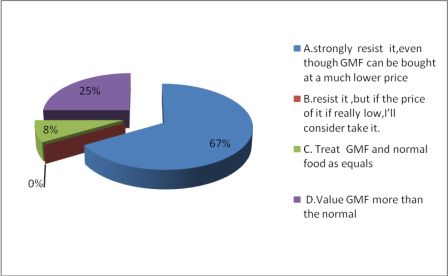
2、 谈到“基因操纵”你最先浮现的情感是那种?
A、恐惧 B、担忧 C、好奇 D、自豪
You are _______when hearing that something is genetically engineered?
A. terrified
B. worried
C. curious
D. proud
File:USTC2010humanpracticesurvey3.png
3、今年你接触到一些有关基因操纵的消息吗?
A、经常,而且会主动寻找相关信息。 B、经常被动接受一些信息
C、偶尔 D、从不
Have you ever heard something about gene manipulation this year?
A. yes,and I willingly search for interesting information about that.
B. Yes,others often told me something related to it
C. Only occasionally
D. Never
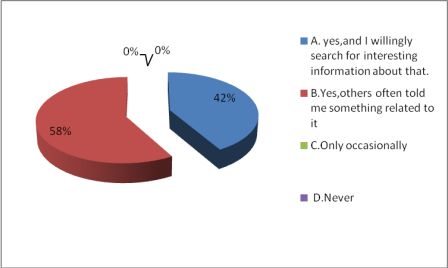
4、你认为基因操纵会对那些方面造成不小的冲击?(可多选)
A、伦理学 B、生物进化 C、人类健康 D、环境污染
E、其他:_________________________________________________
Synthetic biology will have a strong impact on_____________
A. ethics
B. biological evolution
C. human health
D. environmental pollution
E. others_____________________________________________
File:USTC2010humanpracticesurvey4.jpg
5、你在从事科学研究的时候(或者将来从事科学研究时)会不会考虑你所做的工作将来对人类社会的影响(环境、伦理、健康……)?
A、会,而且会针对其作出调整
B、会考虑一部分,但如果会影响研究结果,暂时不会考虑
C、从不考虑
Have you ever consider the impact of your work on Society, in terms of environment, ethics and human health?
A. Yes, think a lot about it.
B. Yes, I’ll think about it, but if it greatly affect my research, I’ll ignore it.
C. Never
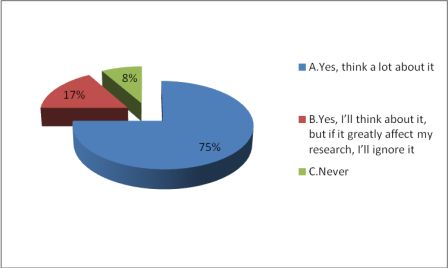
SURVEY BEFORE CAMPUS TALK(SECTION TWO)
We also conducted a survey concerning bioethical problem in which 106 students took part The following is our questions and conclusion.
1. After man could create life according to our will, will people abuse all the creatures as they start to regard creatures as product?
A. yes (56.6%) B. no (43.4%)
2. Does controlling (and destroying) life created by human mean disrespect for life?
A. yes (79.8%) B. no (20.2%)
3. Do you agree with the saying “Increasing the sense of responsibility of research institutions and researchers can avoid potential risk effectively”
A. yes (51.8%) B. no (48.2%)
4. Commercial application of synthesis biology lead to additional potential risk to public safety(risk of unintended consequences and the risk of overreaching our knowledge), and these commercial activities are treated equally to other ordinary ones. Do you think it is fair?
A. yes(49.07%) B. no(50.93%)
5. In terms of the regulation of synthesis biology, which of the following do you think have the biggest responsibility?
A. government B. nongovernmental organizations C. research institutions D. commercial cooperation
From the survey above, we the following conclusions:
1. (question 1-3)As we have seldom heard of claims that synthesis biology is intrinsically wrong, these questions are going to test whether people really support the idea of synthesis biology in ethical perspective. So we try to convey a slightly negative inclination to the respondent in the question (these questionnaires are in Chinese and people with no idea of this question are more easily to give a negative or conservative answer) and see whether they will still give positive answer. We discover that around 40% of respondent give negative answer, which means a considerable percentage of people do not have clear attitude or do not concern about these issues.
2. (question 4,5) The answer of these questions is no surprising. As products related to synthesis biology are not common, people’s view towards these products is conventional and similar to that of other products which is newly developed---for a newly developed field people conventionally think the government has the obligation to regulate and supervise it and people are conventionally distrust commercial organizations.
3. additional information(some of the following is from our experience): (1). Except people’s view to these issues, how much they care about these issues and in what perspective they consider these issues are also essential problems. From our experience, people with no religious belief seldom consider these problems really serious and are open to guidance. (2) Most people consider intrinsic bioethical problem a somewhat metaphysical problem and do not think these problems will make any difference in the material world. (3)As products related to synthesis biology are not common in china, people’s view towards these products and related issues is vague and with no oblivious inclination.
4. we conducted our survey in different apartment(excluding biology department), and the result show almost no difference.
SURVEY AFTER CAMPUS TALK
1.have you ever think about bioethical problems before? What's your attitude towards it?
A. Yes and I support further development of synthesis biology. B. Yes and I don’t support further development of synthesis biology. C.No and I do not think it should be considered seriously. D. I have not certain attitude but I think it should be considered seriously.
2 The change of your attitude towards intrinsic bioethical problems
A. I consider these problems more seriously (75%) B. I think it’s a rather trivial issue(25%)
3.The change of the extent to which synthesis biology should be restricted due to intrinsic bioethical problem according to you after the campus talk
A. increase(42%) B. decrease(58%)
4. the change of your attitude towards safety of product related to synthesis biology
A.less worry about that (0%) B more worry about that (8%)
C no change in attitude but concern more about its safety (92%)
5.The change of your attitude towards the regulation of synthesis biology
A.more optimistic(75%) B. more pessimistic(15.7%) C.no change in attitude but concern more about it(8.3%)
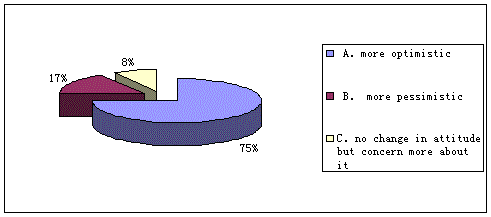 From the data above we could conclude that our campus talk and open day worked out just fine. We do not mean here that we persuade every participant to approve the idea of synthesis biology, but we have successfully conveyed a thorough, though concise, overview of this field to the public.
From the data above we could conclude that our campus talk and open day worked out just fine. We do not mean here that we persuade every participant to approve the idea of synthesis biology, but we have successfully conveyed a thorough, though concise, overview of this field to the public.
 "
"
